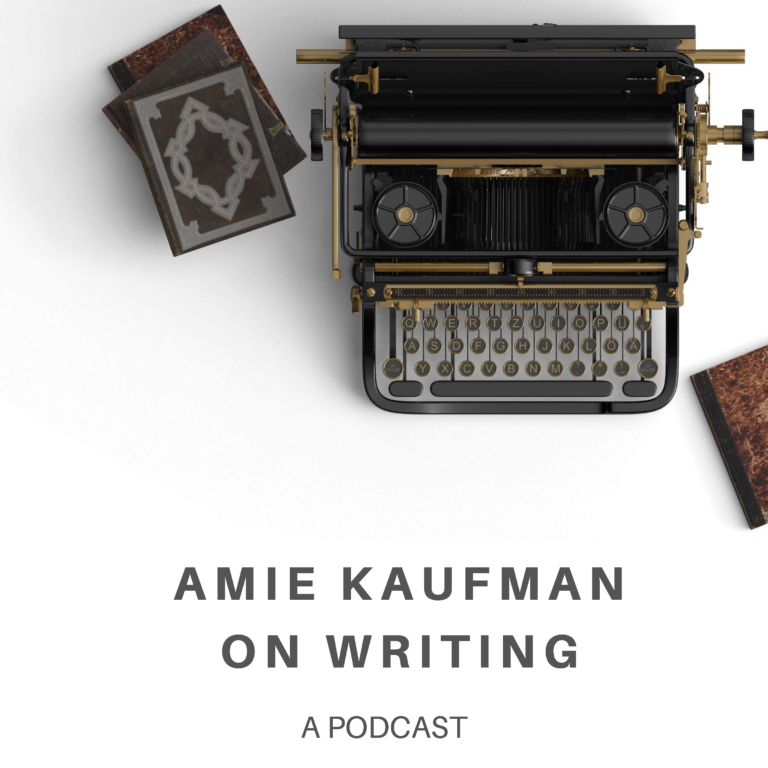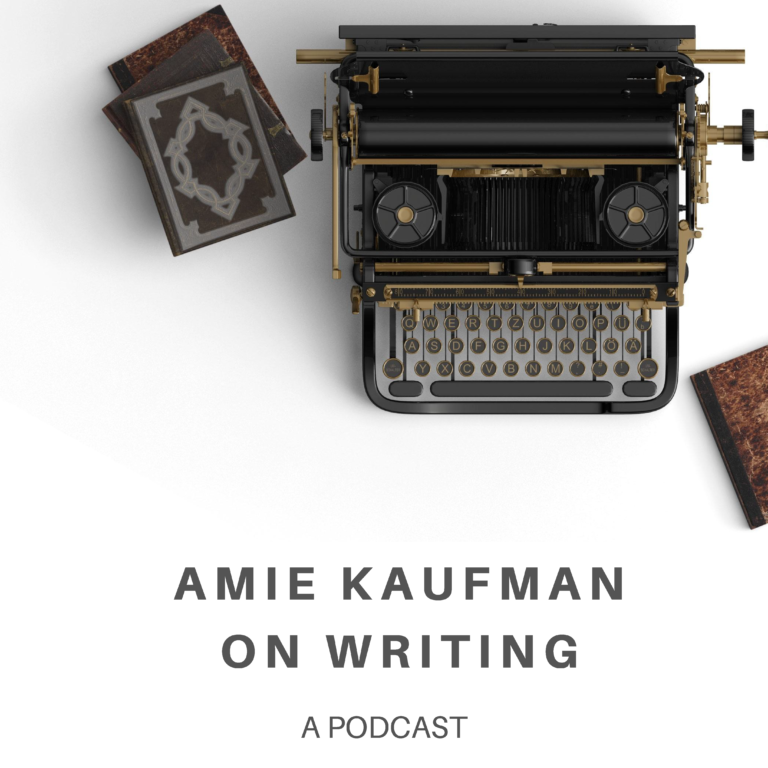Episode 10: Writing Unreliable Narrators

New York Times and internationally bestselling author Amie Kaufman answers one question each week about writing craft. Full of practical tips and an exercise each week, this is a show for writers, for readers who want a backstage look at how their favourite authors craft their stories, or for creative writing classrooms.
You can find a transcript of this episode at my website, where you can also subscribe to my newsletter, get behind-the-scenes peeks at how I write, and any other news about new books, events or the podcast. You can also submit a question for the podcast on my website. You can find me on Twitter or Instagram.

FOLLOW ON APPLE PODCASTS . FOLLOW ON SPOTIFY . FOLLOW ON OVERCAST . FOLLOW ON PODCAST ADDICT
Season 2, Episode 10: Writing Unreliable Narrators
Hi, my friends.
Welcome to Amie Kaufman on Writing, a short podcast that answers one question each week about how writers do what they do.
If you’re a writer, or you’re a reader interested in how your favourite authors craft their stories, then you’re in the right place.
We’ve reached the final episode of Season Two—hard to believe!—and it’s been so wonderful to hear from you about the ways you’ve used the episodes in your own writing, or as a new way to see the books you love, or even in your classrooms.
I have some really fantastic bonus episodes coming up between now and season three, with advice from some guest authors, so make sure you’re subscribed so they drop right into your feed.
For now, this is Season 2, Episode 10: Writing Unreliable Narrators.
Here’s my friend and producer Kate with this week’s question. Hi Kate, how are you?
Hi Amie, I’m good!
This week’s question came from a few different listeners, including Elisabeth, who asked: What do I need to keep in mind when I’m writing an unreliable narrator?
I thought this was such a fun question to wrap the season with—unreliable narrators are interesting in so many ways. What is an unreliable narrator? Well, you are.
When we’re telling someone about something that’s happened to us, none of us ever tell the absolute truth. We recount events in the way we experienced them at the time, or the way we remember them. Which is never precisely the way they happened.
Characters do this too, of course. They tell us what they believe happened—but they might not have all the information, or they might be unaware of their privileges in life, or they might struggle to face the truth about something. They’re people too—even if they’re actually fairies, or talking animals, or aliens.
That said, we generally expect a narrator to give it to us straight—to make an honest effort to tell us the story truthfully. When they don’t—or when we can’t tell if they’re being honest or not—then we’re in unreliable narrator territory.
Unreliable narrators might be obvious from the very start, or they might slowly start to awaken your suspicions as the story progresses. Authors have lots of options.
Why do we write unreliable narrators? Loads of reasons: to create fantastic and unexpected twists when the truth is actually revealed, to keep the reader intrigued, to amp up the tension as the reader starts to question everything they read, and everything they thought they knew.
That said, there’s a risk in writing an unreliable narrator—if you don’t do it well, the reader can end up completely disconnecting from them. Here are some tips to help you get it right.
Step one is this: Know exactly what sort of unreliable narrator you have on your hands. The reader might not be sure, but you should be.
Are they deliberately lying? Do they think they’re telling the truth, oblivious to their own blind spots? What are those blind spots?
Do they have any insight on the fact that they’re not telling you the whole truth?
Are they acting on false information—but they don’t know it’s false, and nor do you?
Write down exactly how the character is misleading the reader—what is being misrepresented or concealed—and why. If it’s a choice they’re making, under what circumstances will they mislead, and why?
This will be your guide as you work your way through the story—you can’t be arbitrary. Even if the reader doesn’t know the narrator’s personal code of conduct, and even if that code changes for reasons you determine, you should always know what it is.
Once you’ve got it, here are some ways you can help the reader get themselves situated—help them realize either quickly or slowly they’re not getting the whole picture.
Option one: If your narrator is a liar, or might be, have the narrator flag it up front—they can say something like “Others tell this story differently, but here’s my version.” Or: “I’m not going to tell you the whole truth—you have to earn that—but here’s a part of it.”
Option two: If the character isn’t going to be open about being unreliable, then have them do something that they don’t think is at all unreasonable—but that makes the reader wonder. A sudden, violent act, for example, followed by a return to polite conversation, can plant the seeds. Does this person see the truth the same way I do? When they say ‘nothing happened’, well . . . they just stabbed a guy and thought it was nothing. So what does that mean?
Option three: Have the narrator be quite obviously cagey—they can drop just enough information that we can see something’s missing. We’re then left to figure out what’s missing, and why—and that means we’ll be questioning what they tell us from this moment onward.
Option four: Use your secondary characters to provide a different version of events—you can either make clear through solid evidence that the secondary character’s got it right, or you can leave the reader wondering which version is true.
Now, often I give examples from my own books, but in this case, I really don’t want to spoil you! I will say this: You should keep these techniques in mind as you read Illuminae.
For now, there you have some options for creating compelling unreliable narrators.
First, make sure you know exactly how the narrator is misleading the reader—to what degree, under what circumstances, on what subjects, knowingly or unknowingly. Then figure out to how to reveal it – by telling you they’re a liar, by calling their judgment into question, by having them be a little cagey, or by having your secondary characters tell a different story.
Here’s an exercise: Think of an event that you and someone you know remember differently—it might be something your siblings swear happened differently to the way you recall it, or that time you showed up just a minute late last week—no big deal!—that your friend recalls a little differently. Write it out from two points of view, and look for a way in each to include a hint that this might not be the real version of events.
And that’s it—we’re at the end of season two! Thank you so much for listening, and for getting in touch from all over the world. Making this podcast is a passion project for me, and I’m so grateful for your support.
Don’t forget to subscribe, so you get to hear our bonus episodes from guest authors during the break between seasons, and as we wrap up, I’d love it if you’d give the podcast a rating and review wherever you listen. If you know someone who’d love it, I’d love you to tell them!
You can find me at my website, which is at amiekaufman.com – you can subscribe to my newsletter there, for behind-the-scenes peeks at how I write, and any other news about new books, events or the podcast. You can also submit a question for the podcast on my website. You can find me on Instagram at @AmieKaufmanAuthor or on twitter at @AmieKaufman. This podcast is produced by the lovely Kate Armstrong, host of one of my favourite podcasts, The Exploress, which time travels through women’s history one era at a time. You can find her at theexploresspodcast.com.
For now, thanks so much for listening – enjoy your reading, and enjoy your writing.
Have a Question?
You can submit your question using the form using the form on the main podcast page — if you’re stuck on one aspect of your work, or you’re wondering how your favourite author pulled something off, we’d love to hear from you!
